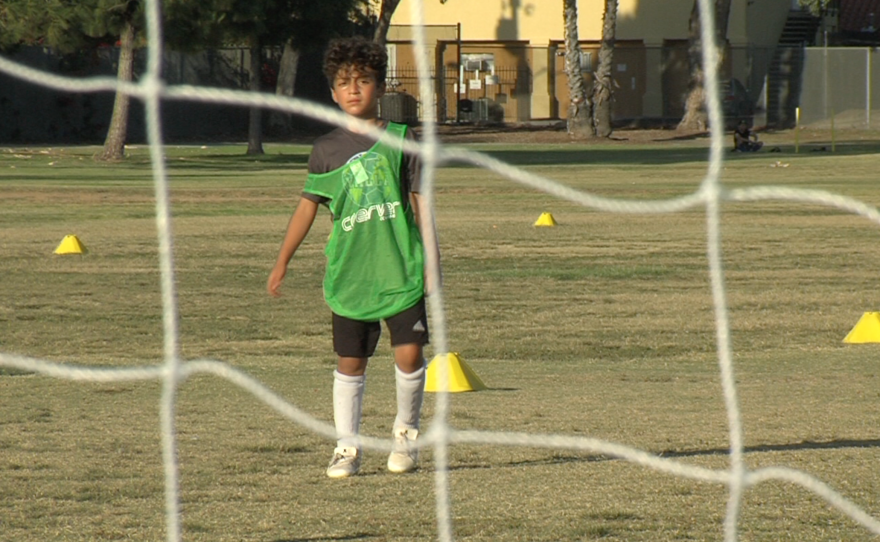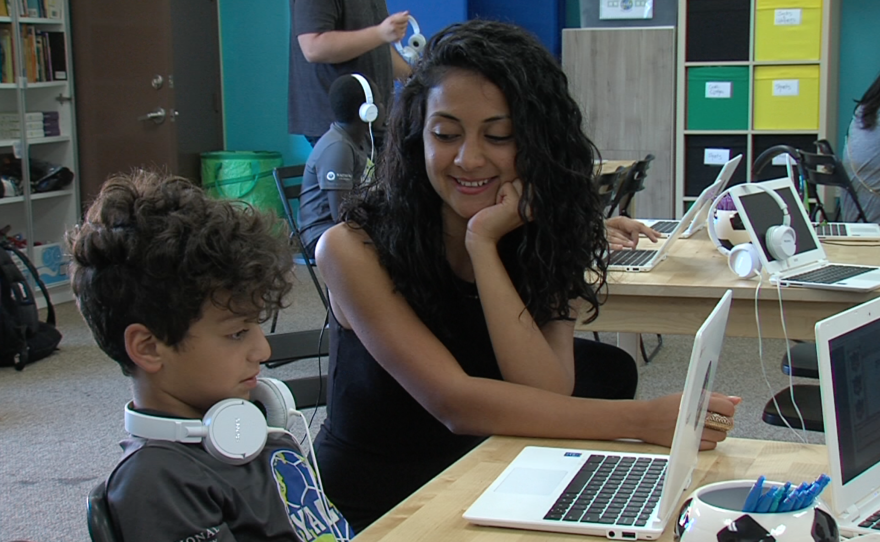Refugees take all kinds of risks to get to the U. S. Once they get here the challenges continue in the form of discrimination are below average grades for kids. When after school program in El Cajon is helping young immigrants excel in school. Jean Guerrero has the story. He is 11 years old and remembers the day his little brother was kidnapped. My little brother came running to us he said somebody tried to get him. I passerby rescued her brother. On the way to the U. S. Mexican officials stopped them and put them in a detention center for more than five months. Amira says it was a nightmare. They were huge bugs roaming around the hold decimal place. When the family made it to the U. S. they applied for sound. Amira thought the nightmare was over. She missed a lot of school. Shatara new language. When she started second grade in San Diego she got it really hard. I felt dumb because I did not know the answers to any of the questions. She says her classmates bullied her. Kids would come up to me and would say, hi, weird girl. I would not understand anything because I do not know any English at the beginning. I with feel like this is a country that I'm not supposed to be in and I am not welcome here. Then her family learned about YALLA. It is an afterschool program that started six years ago. Quickly Amira caught up with her classmates. When you do not understand something in English, it would explain it to you in Spanish. She felt she belonged somewhere. At YALLA students come from Iraq, Honduras, and elsewhere. They bond because they have been uprooted. Her little brother is eight years old and he practices English at the YALLA program. I wish I did not have school today. Helping him is an Iraq a refugee. You should have uppercase words. She says it is key to the success of the program. The soccer part helps build the ties. With soccer you don't usually need a language. It is a universal language for an 20 high school seniors graduated from the YALLA program. They all received scholar -- scholarships. Some donors are withholding their support. He thinks it is because of the current immigration debate. Politically what is happening is the shift in the public attitude toward immigrants, especially people coming from the Middle East. It has affected our young people. He says that YALLA students are complaining a more discrimination at school. Our athletes are coming to us in saying they feel discriminated against. An hour six years I never heard that before. I don't know what to tell them other than this is who we are and we are going to stick together and work hard and keep being the best people that we can be. The Mayor says the support at YALLA helps her to believe in herself. She says that her non-emigrant classmates a she cannot be a heart surgeon because she is Guatemalan. She says she's keeping her eyes on the gold.

Amira Matti remembers the day her little brother was almost kidnapped near their house in Guatemala.
“My little brother comes running to us and he says, ‘Someone tried to get me,’” said the 11-year-old.
A passing driver rescued him from the kidnappers — and Amira’s family decided it was time to get out of Guatemala, with its rising gang violence. On the way to the U.S., Mexican officials stopped the family and put them in a detention center for more than five months. Amira said it was a nightmare.
“You couldn’t sleep cuz there were these huge bugs that were roaming around the whole place and it was like a thousand of them,” she said.
When the family finally made it to the U.S., they applied for asylum. They were allowed into San Diego. Amira thought their nightmare was over. But then she started second grade. She couldn’t speak English and had missed months of school while detained in Mexico.
“Because those past five months I didn’t learn anything. … I felt dumb because I didn’t know the answers to any questions my teacher would ask me,” she said.
Her family is among a rising number of refugees fleeing violence in Central America who are coming to the U.S. Once here, they encounter challenges in the form of discrimination and educational difficulties. Amira’s case is no exception.
She said her classmates bullied her.
“Kids would come up to me, and say, ‘Hi, weird girl,’ and I wouldn’t understand anything because I didn’t know any English in the beginning. And I would think, this is a country I'm not supposed to be in. I’m not welcome here,” she said.
But then her family learned about YALLA, an after-school program that started six years ago. It teaches soccer to refugees and immigrants, using the sport as a fun hook for tutoring sessions.
Quickly, Amira caught up with her classmates with the help of YALLA’s ESL software programs, such as Imagine Learning. The software assessed her weaknesses — reading and writing in English — and focused on improving those areas.
“When you didn’t understand something in English, it would explain it to you in Spanish, and it would tell you to repeat it,” she said of the program.
Amira felt like she finally had a place where she belonged. At YALLA, students come from many different backgrounds: Iraq, Sudan, Honduras and more. They could all relate to one another because they have all been uprooted. They all feel like outsiders. And soccer helps them bond, even when they don’t speak the same language.
“With soccer, you don’t usually need a language to speak in, it’s like a universal language,” said Riyam Mansoor, a refugee from Iraq who works for YALLA.
She said the friendships immigrant students create with the older mentors — many who are immigrants too — are key to the program’s success.
“It starts with asking them how are they doing instead of what grade did they get,” she said.
Mansoor said she can relate to the students because she was in their situation. She, too, struggled in school when she first arrived and was bullied by her classmates.
“Through high school, I was pushed and shoved and told ‘go back to your country,’” she said. “It’s like entering a new planet … especially coming from the Middle East.”
On a recent Monday, she helped Amira’s little brother, Matti — the one who was nearly kidnapped in Guatemala — practice his English. He’s 8 years old and also in the program. When he came across the word “prince” on his Imagine Learning software, he was puzzled.

Mansoor asked: “Have you watched Disney movies?”
Matti shook his head.
“Have you heard of a king and a queen?” she asked.
He nodded.
“So the prince is their son,” Mansoor explained.
Mark Kabban, who started the YALLA program, said soccer helps the staff build friendly relationships with the students.
“We’re able to have healthy manipulation,” he said. “We’re able to influence them a lot more in their academics because of the things we have in soccer.”
This year, 20 high school seniors graduated from the YALLA program, receiving $2.4 million in scholarships. That’s a record for the program. Kabban said he thinks the improvement is tied to the program’s increased use of technology. When YALLA first launched, tutors helped students with their homework on the soccer field. Now, the tutoring is a lot more technology-based. Kabban said the program has come a long way.
But Kabban said that for the first time, donors are holding back when it comes to giving to the organization, including some longtime sponsors for the next round of funding.
“There’s been some donors that don’t like that we serve Muslim kids,” Kabban said. “But at the end of the day, I’m like, if they don’t want to invest in the diversity of our kids, then I don’t want their money.”
He said he thinks the animosity is tied to the current immigration debate.
“Politically, what’s happening I think in the shift of public attitude towards immigrants, especially people coming from the Middle East, has affected our young people,” he said.
Kabban said YALLA students are complaining of increased discrimination at school.
“I don’t know what to kind of tell them, other than, this is who we are and we’re going to stick together and we’re going to keep working hard and be the best people we can be,” he said.
Amira, from Guatemala, said she feels supported at YALLA, and has learned to believe in herself. She has big ambitions.
“I want to be a heart surgeon,” she said.
She said some of her non-immigrant classmates have told her becoming a surgeon is too lofty an ambition because she’s not from here. But she said YALLA has taught her to keep her eyes on the goal.







